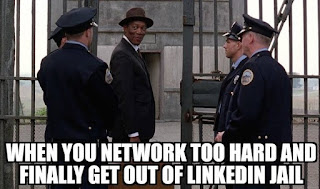So you've waited all week to find out how to network efficiently and effectively. I'm so happy you made it back!
In Part 1, I gave you some ideas of where to find networking groups. I failed mention that there are two types of groups - exclusive and non-exclusive. Exclusive groups are the ones that typically only have one person from an industry. For example, a group would only have one baker, one realtor, one plumber, etc. Non-exclusive means that a group is open to as many people as want to participate. For now I'm going to discuss non-exclusive groups.
If you're introverted or not really comfortable talking to strangers, you can sit at the table of the world's largest networking group, LinkedIn*. If you're not familiar with it (and you should be), think of it as Facebook minus all of the pictures of kids, vacations and political garbage. It's a way to network with people in your area, state, all of the country, and the world too. But it should only be a door opener, not something you should rely on solely.
So let's assume that you've found a networking event and have made the brave decision to attend. Here are some pointers for you.
Following these easy steps helps to avoid cold calling and can keep your calendar full of appointments. As always, leave a comment or suggestion if you have any other great ideas on networking.
*In Part 3, I'll discuss more on how to use social media for networking.
In Part 1, I gave you some ideas of where to find networking groups. I failed mention that there are two types of groups - exclusive and non-exclusive. Exclusive groups are the ones that typically only have one person from an industry. For example, a group would only have one baker, one realtor, one plumber, etc. Non-exclusive means that a group is open to as many people as want to participate. For now I'm going to discuss non-exclusive groups.
If you're introverted or not really comfortable talking to strangers, you can sit at the table of the world's largest networking group, LinkedIn*. If you're not familiar with it (and you should be), think of it as Facebook minus all of the pictures of kids, vacations and political garbage. It's a way to network with people in your area, state, all of the country, and the world too. But it should only be a door opener, not something you should rely on solely.
So let's assume that you've found a networking event and have made the brave decision to attend. Here are some pointers for you.
- Everyone else there should be there for the same reason as you. Most in attendance will be there to network, however, over time, some have forged relationships. It may even seem as if there are cliques.That's fine, but if the group is worth it's salt they will try to welcome you.
- Take business cards, but don't concern yourself with doling them out. In my book, I discuss a lady who advised everyone to show up and hand out cards like they were dealing a card game. Don't do it. If someone asks, have one handy, but...
- Ask for the business cards of others. This helps you to be proactive. Set a goal for the number of cards you get. If it's a one-hour event, I may set a goal of ten.
- When you get someone's card, let them know you'll give them a call to set a time to meet. I usually say, "Is it okay if I call you in the next week or so to set a time to meet at a more appropriate time?" Most people will say yes. If they act hesitant, move on. The key here is that nobody wants to be sold anything at a networking event. Also, they won't be surprised when you do call.
- Finally, call them and remind them that you met at the event and had promised to call. Tell them something like "I'd like to learn more about what you do and share my work with you." Very non-threatening.
Following these easy steps helps to avoid cold calling and can keep your calendar full of appointments. As always, leave a comment or suggestion if you have any other great ideas on networking.
*In Part 3, I'll discuss more on how to use social media for networking.


Comments
Post a Comment